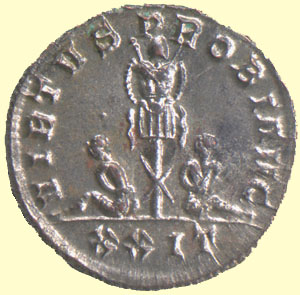 Contents -
Previous Article -
Next Article
Contents -
Previous Article -
Next Article
The trophy of arms with captives seated beneath shown on the reverse of a coin of the emperor Probus would be a fitting tribute to this last of the great Roman generals and patriots, Flavius Aetius.
The early to mid Fifth Century was a time of terrible crisis for the Roman Empire in the West. The gifted and loyal Flavius Aetius did more than any one man to help slow the inevitable fall of the Roman Empire to the barbarian nations in the West during the reign of Valentinian III. His career follows a course similar to another Roman patriot, Flavius Stilicho. In the end, he was, like Stilicho, betrayed by the sovereign whom he had served so well because the cowardly emperor believed that Aetius was about to murder him in order to take his throne.
Aetius was raised amongst Visigoths and had many opportunities to interact with Hunnic tribesmen. It was common in that day for two bordering nations to exchange hostages of royal blood to ensure the good behavior of each party. Aetius was one such hostage in the court of the Huns. Aetius learned the arts of war well and at a young age he could hold his own with grown men. He learned all about fighting from the back of a horse from his Hun friends and combined this with his knowledge of standard Roman infantry tactics to come up with deadly strategies for dealing with almost any enemy.
Some of the battles fought by Aetius became famous while others are known only to scholars of history. In A. D. 436, Aetius and his Hun allies totally devastated the Burgundians in a battle near the German frontier. The slaughter of Burgundian by Hun and Roman was so great that the famous German folk legend of the Ring of the Nieblung was born out of the disaster encountered by the German people in this one battle.
By the late 440ís, the Huns had a new ambitious leader. Attila cared nothing for a treaty with Rome; he was only interested in conquest. After terrorizing the Western Roman Empire and camping about the walls of Constantinople, which could not be taken by the Hunnish horsemen, the Roman army and their new Visigothic allies met Attila in a battlefield near Chalons, France in 451. There was desperate fighting all day and Theodoric, the Visigothic king was killed. (This is not the same Theodoric who was king of Italy sixty years later). The slaughter amongst the Huns was stupendous. It was only because night was falling that the Huns escaped at all. Attila himself prepared a pile of captured saddles and other booty which he intended to set fire to and leap upon if the Romans got too near, preferring death to capture. The slaughter was so great on both sides that the Romans could not follow up their victory and the Attila escaped with the remname of his army.
In September, A. D. 454, Aetius was holding discussions with his emperor concerning the marriage of his son to one of the emperorís daughters. Valentinian III had been growing more and more uneasy over the great popularity and power that his master general possessed. By the same token, Aetius was becoming more and more insistent that his son should someday become emperor. Seized by a sudden fit of fear and anger, Valentinian drew his dagger and slew the faithful general, murdering the only one who stood between the Roman Empire and dismemberment by barbarian nations. The death of Flavius Aetius sounded the death knell for the empire in the West. Twenty - one years later, the last Western emperor was forced to abdicate and the imperial regalia were sent to Zeno in the East with a letter stating they would no longer be needed because there was no longer a western emperor.
Valentinian III eventually got what he so richly deserved for his cowardly little act of treachery. A Hun by the name of Optila who was a friend and admirer of Aetius stabbed the emperor in the temple as he dismounted in the Campus Martius and prepared for a session of archery practice. As the stunned emperor turned to see who had struck him, Optila finished him off with another thrust of his blade. Most of the soldiers standing close by had been faithful followers of Aetius and none lifted a hand to save the cowardly emperor.
Go to next article:
Go back to previous article: